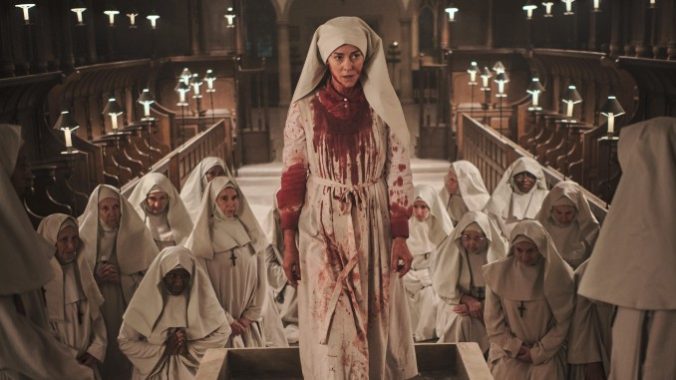Catholic Guilt and Gore Clumsily Converge in Consecration

The dividing line between saint and sinner is intentionally muddled in Consecration, director Christopher Smith’s latest Shudder-premiering horror effort following 2020’s The Banishing. Co-written by Smith and Laurie Cook, the film utilizes run-of-the-mill Catholic possession imagery and unoriginal plot points to convey a hackneyed idea about healing from buried traumas. Though it does hint at the toxicity and conspiratorial nature of a powerful institution, it never finds root in overt observations. It handles too many threads—childhood tragedy, murder cover-ups, clandestine spiritual rites—without the dexterity to effectively weave them together.
Jena Malone plays the blandly sacred-sounding Grace, a young woman who receives dreadful news about her clergyman brother’s passing at the Mount Savior Convent in Scotland. Police believe his death was part of a grim murder-suicide: After killing a fellow priest, he threw himself off of surrounding cliffs and into the rough waters of the Atlantic. Of course, Grace finds this development impossible to believe, and the convent’s oddball Mother Superior (Janet Suzman) doesn’t blame her. She tells Grace that her brother actually died from a demonic possession that he valiantly fought to overcome. Yet something still feels fishy about the entire congregation, particularly when Grace begins to experience intense visions about The Knights of the Morning Star, the original 12th century inhabitants of the grounds who settled there shortly after the crusades. The land’s blood-soaked history feels strongly connected to its present-day religious affiliation, and Vatican visitor Father Romero (Danny Huston) arrives on site to ostensibly cleanse the convent from the oppressive feeling of evil that envelops it.
Beyond its effective script full of half-developed ideas, one of the film’s biggest letdowns is the underwhelming presence of its principal setting and shooting location. Scotland’s famously breathtaking Isle of Skye serves as the backdrop for Consecration’s convent, yet the natural beauty of the island is never captured or defined. In fact, the drab and dreary monotony of Grace’s lonely life as an ophthalmologist follows her to what should be breathtaking vistas of jagged cliffs and rugged ocean waves. The most stunning shot of the impressive landscape is a bloody vision of nuns flinging themselves off of the seaside cliffs in a mass suicide, which honestly feels crass. Obviously, it’s compelling to juxtapose natural beauty with human horrors, but this technique can’t quite hold water if there’s no attempt to present the earthly allure of the region in the first place.
-

-

-

-

-

-

-

-

-

-

-

-

-

-

-

-

-

-

-

-

-

-

-

-

-

-

-

-

-

-

-

-

-

-

-

-

-

-

-

-








































